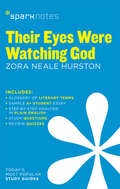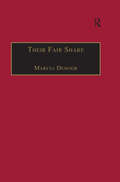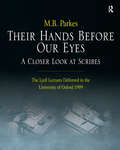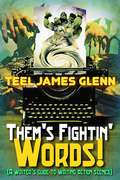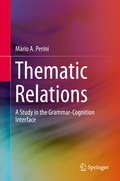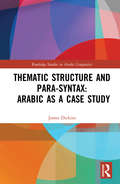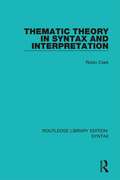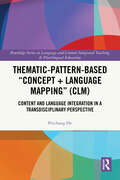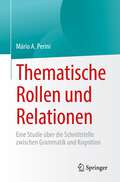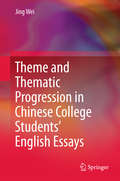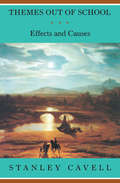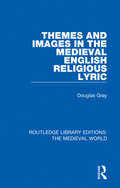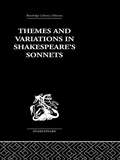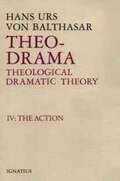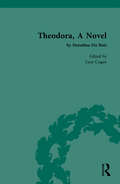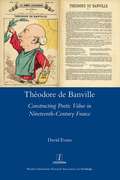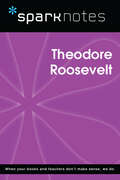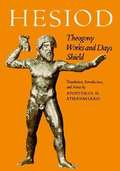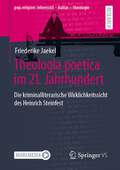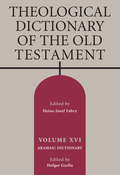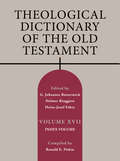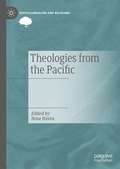- Table View
- List View
Their Eyes Were Watching God SparkNotes Literature Guide (SparkNotes Literature Guide Series #60)
by SparkNotesTheir Eyes Were Watching God SparkNotes Literature Guide by Zora Neale Hurston Making the reading experience fun! When a paper is due, and dreaded exams loom, here's the lit-crit help students need to succeed! SparkNotes Literature Guides make studying smarter, better, and faster. They provide chapter-by-chapter analysis; explanations of key themes, motifs, and symbols; a review quiz; and essay topics. Lively and accessible, SparkNotes is perfect for late-night studying and paper writing. Includes:An A+ Essay—an actual literary essay written about the Spark-ed book—to show students how a paper should be written.16 pages devoted to writing a literary essay including: a glossary of literary termsStep-by-step tutoring on how to write a literary essayA feature on how not to plagiarize
Their Fair Share: Women, Power and Criticism in the Athenaeum, from Millicent Garrett Fawcett to Katherine Mansfield, 1870–1920 (The Nineteenth Century Series)
by Marysa DemoorTheir Fair Share identifies and contextualises many previously unknown critical writings by a selection of well-known turn-of-the-century women. It reveals the networks behind an influential journal like the Athenaeum and presents a more shaded assessment of its position in the field of cultural production, in the period 1870-1920. The Athenaeum (1828-1921) has often been presented as a monolithic institution offering its readers a fairly conservative, male oriented appreciation of a wide variety of contemporary publications. On the basis of archival and biographical material this book presents an entirely new analysis of the reviewing policy of this weekly from 1870, when it came into the hands of the politician Sir Charles Wentworth Dilke, up to and including 1919-1920 when John Middleton Murry became its editor. Dilke, and his editor Norman MacColl, are here revealed to have been committed feminists who enlisted some of the most influential women of their time as critics for their journal. The book looks more specifically at the contributions by, a.o., Millicent Garrett Fawcett, Emilia Dilke, Jane Harrison and Augusta Webster.
Their Hands Before Our Eyes: The Lyell Lectures Delivered in the University of Oxford 1999
by M.B. ParkesThis new book by Malcolm Parkes makes a fundamental contribution to the history of handwriting. Handwriting is a versatile medium that has always allowed individual scribes the opportunity for self-expression, despite the limitations of the pen and the finite number of possible movements.The purpose of this study is to focus on the writing of scribes from late antiquity to the beginning of the sixteenth century, and to identify those features which are a scribe's personal contribution to the techniques and art of handwriting. The book opens with three chapters surveying the various environments in which scribes worked in the medieval West. The following five, based on the author's Lyell Lectures at the University of Oxford, then examine different aspects of the subject, starting with the basic processes of handwriting and copying. Next come discussions of developments in rapid handwriting, with its consequent influence on new alphabets; on more formal 'set hands'; and on the adaptation of movements of the pen to produce elements of style corresponding to changes in the prevailing sense of decorum. The final chapter looks at the significance of some customized images produced by handwriting on the page. The text is illustrated with 69 plates, and accompanied by a glossary of the technical terms applied to handwriting, which in itself makes a significant contribution to the subject.
Them's Fightin' Words
by Teel James GlennJoin professional fight choreographer Teel James Glenn as he takes you on a journey through the process of creating believable and dramatic action scenes in every kind offiction. Using wit and personal experience, he dissects action scenes for the keys to what makes them work. Readers benefit from his combat experience, including eastern martial arts, the physiology and kinetics of weight training and the dramatic story telling from film and stage acting. From fantasy swordfights, barroom brawls, comic combat to martial arts knockabouts, he not only outlines and explains the whys and wherefores of literary violence, he also explores techniques that allow you to create them yourself with a series of fun and easy to do exercises. He takes the mystery out of writing action, but not the excitement!
Thematic Relations: A Study in the Grammar-Cognition Interface
by Mário A. PeriniThis book presents a proposal to better define thematic relations by exploring the relation between language and cognition. It analyzes the relation between grammatically defined roles such as agent and patient (semantic roles), and elaborate thematic relations (ETRs) actually accessible to language users. It shows that many phenomena previously analyzed as grammatical can be described in a more simple and convenient way by postulating direct connection between syntactic complements and cognitive relations present in the schema evoked by the verb. The volume focuses on a topic which has been the object of much discussion in the recent literature, namely the definition and delimitation of semantic roles, proposing new solutions to some important theoretical and practical problems in the description of the lexicogrammatical structure of languages, and in particular of verb valency. It shows that in many cases a direct relation can be established between morphosyntactic units and functions, on one hand, and ETRs, on the other, without the intermediation of grammatically defined semantic roles. This makes it possible to analyze thematic relations that have been traditionally problematic, such as the patient, in a linguistically simple and cognitively well-motivated way. Thematic Relations – A Study in the Grammar-Cognition Interface will be a useful resource for practicing linguists working on the analysis of natural languages, in particular on verb valency; verb subcategorization and thematic structure; semantic (thematic) roles, their definition and syntactic coding; the relation between grammatical structure and cognitive schemata (frames); and the structure of the lexicon.
Thematic Structure and Para-Syntax: Arabic As A Case Study (Routledge Studies in Arabic Linguistics)
by James DickinsThematic Structure and Para-Syntax: Arabic as a Case Study presents a structural analysis of Arabic, providing an alternative to the traditional notions of theme and rheme. Taking Arabic as a case study, this book claims that approaches to thematic structure propounded in universalist linguistic theories, of which Hallidayan systemic functional linguistics is taken as an illustrative example, are profoundly wrong. It argues that in order to produce an analysis of thematic structure and similar phenomena which is not undermined by its own theoretical presuppositions, it is necessary to remove such notions from the domain of linguistic and semiotic theory. The book initially focuses on Sudanese Arabic, because this allows for a beautifully clear exposition of general principles, before applying these principles to Modern Standard Arabic, and some other Arabic varieties. This book will be of interest to scholars in Arabic linguistics, linguistic theory, and information structure.
Thematic Theory in Syntax and Interpretation (Routledge Library Editions: Syntax #6)
by Robin ClarkIn recent years, lexical argument structure, in the guise of thematic roles, has come to play an increasingly important part in syntactic theory. The first part of this book, first published in 1990, explores the interplay between thematic role assignment and movement processes, with particular reference to the explanatory problem of nominalisation. The second part explores the relationship between thematic roles and control. Particularly close attention is paid to implicit arguments, arbitrary control and adverbs of quantification. A theory of control is presented which unifies obligatory and non-obligatory control. The theory of control, furthermore, generalises to account for the binding gaps in purposive clauses, tough movement constructions, infinitival clauses and other constructions which have typically been analysed as involving long-distance dependencies. This title will be of interest to students of linguistics.
Thematic-Pattern-Based “Concept + Language Mapping”: Content and Language Integration in a Transdisciplinary Perspective (Routledge Series in Language and Content Integrated Teaching & Plurilingual Education)
by Peichang HeThis book explores the issue of “integration” in content and language integrated learning (CLIL), and addresses the need for effective content and language integration by proposing the thematic-pattern-based “Concept+Language Mapping” (CLM) approach.Peichang He explores effective integration of content and language learning during the instruction of content subjects using students’ additional language as the medium of instruction. The volume introduces the contextual background of a large-scale school-university collaboration CLIL research project and builds the conceptual framework of a thematic-pattern-based CLM pedagogy by drawing on the language-based theory of learning (Halliday, 1993), the construct of thematic patterns (Lemke, 1990), and the recent development of genre-based pedagogy (Lin, 2016; Rose & Martin, 2012). The research probes the design of thematic-pattern-based CLM teaching resources and examines the impact of the CLM pedagogy on students’ development of language and content knowledge during their learning of different junior and senior English Medium Instructed subjects. The author enhances the conceptual framework based on the ongoing research findings and the burgeoning literature on translanguaging practice (García & Li, 2014; Lemke & Lin, 2022; Lin, 2019) and proposes a trans-disciplinary plurilingual thematic-pattern-based CLM approach. The book concludes with a discussion on some promising future research orientations including a transdisciplinary plurilingual thematic-pattern-based CLM approach for CLIL sustainability, catering for learner diversity in CLIL, and teacher professional development in thematic-pattern-based CLM practice. The book shows readers the design of CLM materials and activities which are demonstrated through classroom interactions in lessons of different subjects and grades for students of diverse cognitive abilities and linguistic backgrounds.This insightful volume will be of interest to researchers and trainee teachers exploring pedagogical approaches to CLIL, plurilingual, and transdisciplinary education and will provide pedagogical implications for teachers of both language and content subjects in schools worldwide.
Thematische Rollen und Relationen: Eine Studie über die Schnittstelle zwischen Grammatik und Kognition
by Mário A. PeriniDieses Buch präsentiert einen Vorschlag zur besseren Definition thematischer Beziehungen, indem es die Beziehung zwischen Sprache und Kognition untersucht. Es analysiert die Beziehung zwischen grammatisch definierten Rollen wie Agent und Patient (semantische Rollen) und elaborierten thematischen Relationen (ETRs), die den Sprachbenutzern tatsächlich zugänglich sind. Es wird gezeigt, dass viele Phänomene, die zuvor als grammatikalisch analysiert wurden, auf einfachere und bequemere Weise beschrieben werden können, indem eine direkte Verbindung zwischen syntaktischen Ergänzungen und kognitiven Beziehungen, die in dem durch das Verb hervorgerufenen Schema vorhanden sind, postuliert wird. Der Band konzentriert sich auf ein Thema, das in der jüngeren Literatur viel diskutiert wurde, nämlich die Definition und Abgrenzung semantischer Rollen, und schlägt neue Lösungen für einige wichtige theoretische und praktische Probleme bei der Beschreibung der lexikogrammatischen Struktur von Sprachen und insbesondere der Verbvalenz vor. Es wird gezeigt, dass in vielen Fällen eine direkte Beziehung zwischen morphosyntaktischen Einheiten und Funktionen einerseits und ETRs andererseits hergestellt werden kann, ohne die Vermittlung von grammatisch definierten semantischen Rollen. Dadurch wird es möglich, traditionell problematische thematische Relationen, wie z.B. den Patienten, auf linguistisch einfache und kognitiv gut motivierte Weise zu analysieren. Thematische Beziehungen - Eine Studie über die Schnittstelle zwischen Grammatik und Kognition ist ein nützliches Hilfsmittel für Linguisten, die sich mit der Analyse natürlicher Sprachen beschäftigen, insbesondere mit der Valenz von Verben, der Subkategorisierung von Verben und der thematischen Struktur, den semantischen (thematischen) Rollen, ihrer Definition und syntaktischen Kodierung, der Beziehung zwischen grammatischer Struktur und kognitiven Schemata (Frames) und der Struktur des Lexikons.
Theme and Thematic Progression in Chinese College Students' English Essays
by Jing WeiThis book focuses on how instruction affects English learners' use of Theme and thematic progression (thematic organization). While thematic organization in learner English has been extensively studied, little research has been done to investigate the effects of instruction on the use of Theme and thematic progression. Adopting a Systemic Functional Grammar approach, this study explores how a ten-week instruction on thematic organization affects Chinese college students' use of Theme and thematic progression by comparing their English essays before and after the instruction, with native-speaker essays as the research baseline. Second-language acquisition researchers, curriculum developers and foreign language teachers will find this book useful as it not only presents a clear and detailed report of how Chinese college students learn to make better thematic choices, but also provides a well-developed instructional package on Theme and thematic progression.
Themes Out Of School: Effects and Causes
by Stanley CavellIn the first essay of this book, Stanley Cavell characterizes philosophy as a "willingness to think not about something other than what ordinary human beings think about, but rather to learn to think undistractedly about things that ordinary human beings cannot help thinking about, or anyway cannot help having occur to them, sometimes in fantasy, sometimes as a flash across a landscape. " Fantasies of film and television and literature, flashes across the landscape of literary theory, philosophical discourse, and French historiography give Cavell his starting points in these twelve essays. Here is philosophy in and out of "school," understood as a discipline in itself or thought through the works of Shakespeare, Molière, Kierkegaard, Thoreau, Brecht, Makavejev, Bergman, Hitchcock, Astaire, and Keaton.
Themes and Images in the Medieval English Religious Lyric (Routledge Library Editions: The Medieval World #15)
by Douglas GrayOriginally published in 1972, Themes and Images in the Medieval English Religious Lyric discusses themes and images in religious lyric poetry in Medieval English poetry. The book looks at the affect that tradition and convention had on the religious poetry of the medieval period. It examines the background of the lyrics, including the Latin tradition which was inherited by medieval vernacular and shows how religious lyric poetry presents, through a rich variety of images, the significant incidents in the scheme of Christ’s redemption, such as the Annunciation, the Nativity, the Passion and the Resurrection. It also considers the lyrics which were designed to assist humanity in the task of living in a Christian life, as well as those which prepared them for death.
Themes and Variations in Shakespeare's Sonnets
by J B LeishmanFirst published in 1961. This study analyses Shakespeare's treatment of the universal themes of Beauty, Love and Time. He compares Shakespeare with other great poets and sonnet writers - Pindar, Horace and Ovid, with Petrarch, Tasso and Ronsart, with Shakespeare's own English predecessors and contemporaries, notably Spenser, Daniel and Drayton and with John Donne. By discussing their resemblances and differences, a not altogether orthodox picture of Shakespeare's attitude to life is presented, which suggests that he was not as phlegmatic and equable a person as critics have often supposed.
Themes in Literature (4th edition)
by Jan AndersonEach anthology in the A Beka Book literature series is a valuable tool to the Christian young person seeking to increase his knowledge of good literature. The student will be exposed to a wide variety of short stories, poems, essays, and plays and to a good balance of serious and humorous selections from some of the finest writers of world literature. Works included in this series have been chosen for their literary and moral merit. Although A Beka Book may not endorse the entire contents of each selection or the work from which it is taken, selections reflect Christian principles with an emphasis on character-building and life-enriching themes. * Part of the learning process is developing proper discernment according to the truths of the Scripture, realizing that while a Christian may not be able to entirely approve of an author's beliefs, lifestyle, or work, he can appreciate the author's God-given talent. Selections included in Themes in Literature are intended to increase the student's appreciation of literature and help him develop a love for reading. The main goal of the text is to provide enjoyable prose and poetry for student reading.
Themes in Literature - Quizzes/Tests
by Pensacola Christian CollegeABEKA Themes in Literature - Quiz and Test Book
Theo-Drama: The Action (Theological Dramatic Theory #4)
by Hans Urs Von BalthasarHaving presented his christology and mariology under the sign of the "Dramatis Personae" in volume three of Theo-Drama, von Balthasar now turns to the action of the divine drama itself. Here we find his soteriology, where time, freedom, history, power, sin, conflict are seen in the light of the Cross, the culmination of the action and passion of God and man. <p><p> As Balthasar expresses it in the conclusion to his preface: here "we discern the unity of 'glory' and the 'dramatic'. God's glory, as it appears in the world--supremely in Christ--is not something static that could be observed by a neutral investigator. It manifests itself only through the personal involvement whereby God himself comes forth to do battle and is both victor and vanquished. If this glory is to come within our range at all, an analogous initiative is called for on our part. Revelation is a battlefield. Those who do battle on it can only be believers and theologians, provided they have equipped themselves with the whole armor of God (Eph 6:11)."
Theodora, A Novel: by Dorothea Du Bois (Chawton House Library: Women's Novels)
by Dorothea Du BoisTheodora, A Novel by Dorothea Du Bois, published in 1770, is an entertaining and frequently shocking tale of a young woman’s efforts to regain her position in high society after her aristocratic father’s abandonment of and denial of marriage to her mother. The two-volume work is a thinly-veiled fictionalisation of Du Bois’s eventful personal history and the novel represents just one prong of what was a very public campaign to assert what she believed was her rightful place among the nobility of Ireland and Britain. Central to the narrative of Theodora is the powerlessness of women in the face of a system, moral, social and legal, that was designed to enshrine and protect patriarchal interests. In this manner Theodora exposes the gross injustices of eighteenth century society. This scholarly edition of Du Bois’s novel introduces readers to a unique voice in women’s writing of the eighteenth century that has been undeservedly dismissed by literary history for far too long.
Theodore De Banville: Constructing Poetic Value in Nineteenth-century France
by David EvansTheodore de Banville (1823-1891) was a prolific poet, dramatist, critic and prose fiction writer whose significant contribution to poetic and aesthetic debates in nineteenth-century France has long been overlooked. Despite his profound influence on major writers such as Baudelaire, Rimbaud, Verlaine and Mallarme, Banville polarised critical opinion throughout his fifty-year career. While supporters championed him as a virtuoso of French verse, many critics dismissed his formal pyrotechnics, effervescent rhythms and extravagant rhymes as mere clowning. This book explores how Banville's remarkably coherent body of verse theory and practice, full of provocative energy and mischievous humour, shaped debates about poetic value and how to identify it during a period of aesthetic uncertainty caused by diverse social, economic, political and artistic factors. It features a detailed new reading of Banville's most infamous and misunderstood text, the Petit Traitede poesie francaise, as well as extended analyses of verse collections such as Les Stalactites, Odes funambulesques, Les Exiles, Trente-six Ballades and Rondels, illuminated by wide reference to Banville's plays, fiction and journalism. Evans elucidates not only aesthetic tensions at the heart of nineteenth-century French verse, but also a centuries-old tension between verse mechanisms and an unquantifiable, mysterious and elusive poeticity which emerges as one of the defining narratives of poetic value from the Middle Ages, via the Grands Rhetoriqueurs and Dada, to the experiments of the OuLiPo and beyond.
Theodore Roosevelt (SparkNotes Biography Guide)
by SparkNotesTheodore Roosevelt (SparkNotes Biography Guide) Making the reading experience fun! SparkNotes Biography Guides examine the lives of historical luminaries, from Alexander the Great to Virginia Woolf. Each biography guide includes:An examination of the historical context in which the person lived A summary of the person&’s life and achievements A glossary of important terms, people, and events An in-depth look at the key epochs in the person&’s career Study questions and essay topics A review test Suggestions for further reading Whether you&’re a student of history or just a student cramming for a history exam, SparkNotes Biography guides are a reliable, thorough, and readable resource.
Theogony, Works and Days, Shield
by Apostolos N. Athanassakis HesiodTranslation of 3 texts by Hesiod.
Theologia poetica im 21. Jahrhundert: Die kriminalliterarische Wirklichkeitssicht des Heinrich Steinfest (pop.religion: lebensstil – kultur – theologie)
by Friederike JaekelDas vorliegende Buch zielt auf eine theologische Sensibilisierung für explizit nicht religiös qualifizierte Literaturformen. Durch eine interdisziplinäre und kulturhermeneutische Konzeption wird ein Beitrag für die Praktische Theologie, den aktuellen literaturtheologischen Forschungsdiskurs sowie für die Gestaltung von Kirche und Predigt sichergestellt. Im Rahmen einer exemplarischen Auseinandersetzung mit dem kriminalliterarischen Werk des Schriftstellers Heinrich Steinfest wird der Frage nachgegangen, ob sich innerhalb eines literarischen Werks eine sogenannte unsichtbare Theologie ausmachen lässt, die sich als die Artikulation und Reflexion einer unsichtbaren Religion verstehen lässt und somit ein neues Licht auf die Frage nach der Umformung des christlichen Denkens in der Neuzeit wirft.
Theological Dictionary of the Old Testament, Volume XVI (Theological Dictionary Of The Old Testament Ser. #11)
by G. Johannes Botterweck; Helmer Ringgren; Heinz-Josef FabryVolume XVI concludes the monumental, critically acclaimed Theological Dictionary of the Old Testament with an Aramaic dictionary.This latest and last TDOT volume incorporates nearly the complete lexicon of Biblical Aramaic as well as a major portion of the theologically, culturally, and historically relevant terms in other ancient Aramaic writings. Each article provides information on the term&’s meaning and usage, is fully annotated, and contains a bibliography with cross-references to the entire TDOT series.Further enhancing this volume are an introductory overview of the history of Aramaic and a comparative grammatical outline of ancient Aramaic at the end of the book.
Theological Dictionary of the Old Testament, Volume XVI (Theological Dictionary Of The Old Testament Ser. #14)
by G. Johannes Botterweck; Helmer Ringgren; Heinz-Josef FabryVolume XVI concludes the monumental, critically acclaimed Theological Dictionary of the Old Testament with an Aramaic dictionary.This latest and last TDOT volume incorporates nearly the complete lexicon of Biblical Aramaic as well as a major portion of the theologically, culturally, and historically relevant terms in other ancient Aramaic writings. Each article provides information on the term&’s meaning and usage, is fully annotated, and contains a bibliography with cross-references to the entire TDOT series.Further enhancing this volume are an introductory overview of the history of Aramaic and a comparative grammatical outline of ancient Aramaic at the end of the book.
Theological Dictionary of the Old Testament, Volume XVII: Index Volume (Theological Dictionary of the Old Testament)
by Ronald E. PitkinThis useful resource, which concludes the illustrious Theological Dictionary of the Old Testament, provides TDOT users with an index to all sixteen previous volumes. The first part of this volume indexes keywords in Hebrew, Aramaic, and English, while the second part indexes all textual references—both biblical and extrabiblical.
Theologies from the Pacific (Postcolonialism and Religions)
by Jione HaveaThis book offers engagements with topics in mainline theology that concern the lifelines in and of the Pacific (Pasifika). The essays are grouped into three clusters. The first, Roots, explores the many roots from which theologies in and of Pasifika grow – sea and (is)land, Christian teachings and scriptures, native traditions and island ways. The second, Reads, presents theologies informed and inspired by readings of written and oral texts, missionary traps and propaganda, and teachings and practices of local churches. The final cluster, Routes, places Pasifika theologies upon the waters so that they may navigate and voyage. The ‘amanaki (hope) of this work is in keeping talanoa (dialogue) going, in pushing back tendencies to wedge the theologies in and of Pasifika, and in putting native wisdom upon the waters. As these Christian and native theologies voyage, they chart Pasifika’s sea of theologies.
